|
|
|
Sort Order |
|
|
|
Items / Page
|
|
|
|
|
|
|
| Srl | Item |
| 1 |
ID:
091377
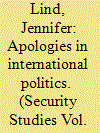

|
|
|
|
|
| Publication |
2009.
|
| Summary/Abstract |
This article examines the growing conventional wisdom that apologies and other acts of contrition are necessary for international reconciliation. I create and test a theory that connects a country's remembrance with that country's image-threatening or benign-in the eyes of former adversaries. I evaluate the theory in two post-World War II case studies: South Korean relations with Japan and French relations with Germany.
This article offers three major findings. First, it substantiates the claim that denials inhibit reconciliation. Japanese denials and history textbook omissions have elevated distrust and fear among Koreans (as well as Chinese and Australians). Second, although whitewashing and denials are indeed pernicious, the conventional wisdom about the healing power of contrition must be seriously reconsidered. Evidence from the Japanese and other cases suggests that contrition risks triggering a domestic backlash, which alarms former adversaries. Finally, there is good news for the prospects of international reconciliation: countries have reconciled quite successfully without any contrition at all. West Germany actually offered very little contrition at the time of its dramatic reconciliation with France; many other countries have restored close and productive relations without contrition. The best course for reconciliation is to remember the past in ways that are unifying, rather than divisive, and minimize the risk of backlash.
|
|
|
|
|
|
|
|
|
|
|
|
|
|
|
|
| 2 |
ID:
091791
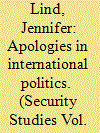

|
|
|
|
|
| Publication |
2009.
|
| Summary/Abstract |
This article examines the growing conventional wisdom that apologies and other acts of contrition are necessary for international reconciliation. I create and test a theory that connects a country's remembrance with that country's image-threatening or benign-in the eyes of former adversaries. I evaluate the theory in two post-World War II case studies: South Korean relations with Japan and French relations with Germany.
This article offers three major findings. First, it substantiates the claim that denials inhibit reconciliation. Japanese denials and history textbook omissions have elevated distrust and fear among Koreans (as well as Chinese and Australians). Second, although whitewashing and denials are indeed pernicious, the conventional wisdom about the healing power of contrition must be seriously reconsidered. Evidence from the Japanese and other cases suggests that contrition risks triggering a domestic backlash, which alarms former adversaries. Finally, there is good news for the prospects of international reconciliation: countries have reconciled quite successfully without any contrition at all. West Germany actually offered very little contrition at the time of its dramatic reconciliation with France; many other countries have restored close and productive relations without contrition. The best course for reconciliation is to remember the past in ways that are unifying, rather than divisive, and minimize the risk of backlash.
|
|
|
|
|
|
|
|
|
|
|
|
|
|
|
|
| 3 |
ID:
151339
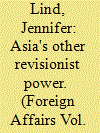

|
|
|
|
|
| Summary/Abstract |
Donald Trump’s election as U.S. president threatens to upend the world’s most important bilateral relationship. On the campaign trail, Trump promised to label China a currency manipulator and to respond to its “theft of American trade secrets” and “unfair subsidy behavior” by levying a 45 percent tariff on Chinese exports [2]. As president-elect, he reversed four decades of U.S. policy when he spoke by telephone with Taiwanese President Tsai Ing-wen and declared [3] that the United States was not bound by the “one China” policy, the diplomatic understanding that has underpinned Washington’s approach to Beijing since 1979.
|
|
|
|
|
|
|
|
|
|
|
|
|
|
|
|
| 4 |
ID:
107650
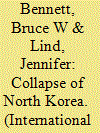

|
|
|
|
|
| Publication |
2011.
|
| Summary/Abstract |
In North Korea, the upcoming leadership transition in the Kim Jong-il regime will be a precarious time for the Kim family's hold on power. A collapse of the North Korean government could have several dangerous implications for East Asia, including "loose nukes," a humanitarian disaster, a regional refugee crisis, and potential escalation to war between China and the United States. To respond to a collapse and these problems, neighboring countries may perform several military missions to stabilize North Korea. These include the location and securing of North Korean weapons of mass destruction, stability operations, border control, conventional disarmament, and combat/deterrence operations. Assuming that collapse occurs in a relatively benign manner, military missions to stabilize North Korea could require 260,000 to 400,000 troops. If collapse occurs after a war on the peninsula, or if it sparks civil war in North Korea, the number of missions-and their requirements-would grow. Because of the size and complexity of these missions, and because of the perils associated with mismanaging them, advance and combined planning is essential. Combined planning should include those actors (e.g., China, South Korea, and the United States) that could otherwise take destabilizing action to protect their own interests.
|
|
|
|
|
|
|
|
|
|
|
|
|
|
|
|
| 5 |
ID:
107810
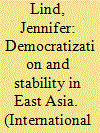

|
|
|
|
|
| Publication |
2011.
|
| Summary/Abstract |
Anticipating future political transitions in East Asia, many scholars worry that Chinese democratization and Korean unification will fuel regional instability. To inform this debate, this article examines theories that make competing claims about the stability of these potential transitions: theories within the "democratization and war" school and economic interdependence theory. I compare the predictions of these theories in the cases of previous East Asian transitions in Japan, South Korea, and Taiwan. Process-tracing evidence shows that (i) xenophobic nationalism or logrolling by political coalitions were not present and that none of these countries pursued bellicose foreign policies during their democratic transitions. Evidence from these cases undermines the broad formulation of democratization and war theory and is consistent with a more recent, narrower version of this theory. Second, (ii) process tracing reveals the stabilizing processes of economic interdependence in all of these cases. Third and finally, contrary to prevailing views that warn of instability during future transitions, (iii) both the narrow version of democratization and war theory and economic interdependence theory forecast stability during the upcoming political transitions in China and Korea. These findings support foreign policy strategies of economic and institutional engagement toward China and the Korean peninsula.
|
|
|
|
|
|
|
|
|
|
|
|
|
|
|
|
| 6 |
ID:
105881
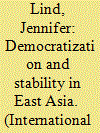

|
|
|
|
|
| Publication |
2011.
|
| Summary/Abstract |
Anticipating future political transitions in East Asia, many scholars worry that Chinese democratization and Korean unification will fuel regional instability. To inform this debate, this article examines theories that make competing claims about the stability of these potential transitions: theories within the "democratization and war" school and economic interdependence theory. I compare the predictions of these theories in the cases of previous East Asian transitions in Japan, South Korea, and Taiwan. Process-tracing evidence shows that (i) xenophobic nationalism or logrolling by political coalitions were not present and that none of these countries pursued bellicose foreign policies during their democratic transitions. Evidence from these cases undermines the broad formulation of democratization and war theory and is consistent with a more recent, narrower version of this theory. Second, (ii) process tracing reveals the stabilizing processes of economic interdependence in all of these cases. Third and finally, contrary to prevailing views that warn of instability during future transitions, (iii) both the narrow version of democratization and war theory and economic interdependence theory forecast stability during the upcoming political transitions in China and Korea. These findings support foreign policy strategies of economic and institutional engagement toward China and the Korean peninsula
|
|
|
|
|
|
|
|
|
|
|
|
|
|
|
|
| 7 |
ID:
092261


|
|
|
|
|
| Publication |
2009.
|
| Summary/Abstract |
How can Japan put its past behind? Scholars, journalists, and activists frequently argue that Japan cannot solve its "history problem" unless it follows West Germany's lead in offering contrition for World War II violence. Into this debate, Jennifer Lind's Sorry States: Apologies in International Politics offers an original and provocative contribution. Lind argues that while countries should acknowledge past atrocities, frequent public apologies can be domestically polarizing and diplomatically counterproductive. Sorry States outlines a theory of remembrance and threat perception and tests it in a comparative study of Japanese-South Korean and Franco-German relations after World War II. Its methods, data, and findings will interest not only East Asianists, but also scholars of international reconciliation and security studies more broadly. This roundtable presents three critical essays in addition to a response by the author. They discuss the mechanisms through which historical memory influences perceptions of threat, the relative weight of ideational versus material factors in threat perception, and whether changes in international norms and economic interdependence may increasingly pressure countries to confront past violence.
|
|
|
|
|
|
|
|
|
|
|
|
|
|
|
|
| 8 |
ID:
163308


|
|
|
|
|
| Summary/Abstract |
The liberal world order is in peril. Seventy-five years after the United States helped found it, this global system of alliances, institutions, and norms is under attack like never before. From within, the order is contending with growing populism, nationalism, and authoritarianism. Externally, it faces mounting pressure from a pugnacious Russia and a rising China. At stake is the survival of not just the order itself but also the unprecedented economic prosperity and peace it has nurtured
|
|
|
|
|
|
|
|
|
|
|
|
|
|
|
|
| 9 |
ID:
182588
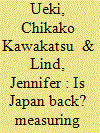

|
|
|
|
|
| Summary/Abstract |
Observers of East Asia frequently claim that Japanese nationalism is on the rise, and that Tokyo is abandoning its longtime military restraint. To determine whether these trends are indeed occurring, we define and measure Japan's nationalism and military assertiveness; we measure whether they are rising relative to Japan in the past, and relative to seven other countries.
|
|
|
|
|
|
|
|
|
|
|
|
|
|
|
|
| 10 |
ID:
158858
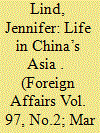

|
|
|
|
|
| Summary/Abstract |
For now, the United States remains the dominant power in East Asia, but China is quickly closing the gap. Although an economic crisis or domestic political turmoil could derail China’s rise [1], if current trends continue, China will before long supplant the United States [2] as the region’s economic, military, and political hegemon.
|
|
|
|
|
|
|
|
|
|
|
|
|
|
|
|
| 11 |
ID:
159476


|
|
|
|
|
| Summary/Abstract |
Since oil began fueling the global economy, governments have employed policies of “energy mercantilism” to secure access to this key input. Critics of these policies claim they are unnecessary because oil can be acquired on global markets. Countries such as China that engage in energy mercantilism are thus neither enhancing their energy security nor threatening others' access to oil. These critics, however, misunderstand the logic of energy mercantilism, which is rooted in the economics and business literatures on supply chain management. Firms and states are correct to worry about access to critical supplies under four conditions: imperfect contracting, supplier collusion, geographic concentration, and high risk of conflict. All of these conditions plague the oil industry. Likewise, the energy mercantilist policies that critics deride are analogous to the strategies that firms adopt to protect their supply chains. China's steps to ensure access to oil have enhanced its energy security and reduced U.S. coercive options toward Beijing. More broadly, the unfolding competition over energy access highlights the lingering power of mercantilism, even in this age of economic globalization and the apparent triumph of market liberalism.
|
|
|
|
|
|
|
|
|
|
|
|
|
|
|
|
| 12 |
ID:
160965
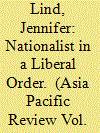

|
|
|
|
|
| Summary/Abstract |
In the past few years, many wealthy democracies have exhibited significant backlash against the liberal international order. Why has Japan—also a leader of this order—remained comparatively calm? I argue that though Japan was a prominent member of the liberal international order, in many ways it pursued policies far less liberal than those of its partners. Japanese trade policies (lingering trade barriers in in agriculture and non-tariff barriers in industrial sector) protected different sectors of the Japanese economy. Where Japan did liberalize, the government upheld the social compact of extending benefits to dislocated workers. Furthermore, Japan’s strict immigration policy contrasts with far more welcoming immigration policies in Europe and the United States. Tokyo deferred to public skepticism about immigration (rather than disregarding it, as did American and European leaders). The more nationalist agenda of a leading liberal state is critical for understanding both the roots of the current crisis in the liberal international order—and how it might be saved.
|
|
|
|
|
|
|
|
|
|
|
|
|
|
|
|
| 13 |
ID:
089284
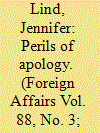

|
|
|
|
|
| Publication |
2009.
|
| Summary/Abstract |
More than 60 years after the end of World War II, chilly relations in East Asia stand in stark contrast to the thaw in western Europe. Germans have spent decades confronting and atoning for the crimes of the Nazi era. Today, Germany is welcomed as a leader in trade and diplomacy, and its military forces fight alongside those of its allies in UN and NATO operations. In 2004, the former Allies invited German Chancellor Gerhard Schröder to the 60th anniversary commemoration of the Normandy invasion. Standing beside the leaders of Germany's former adversaries, Schröder celebrated the day as the anniversary of Germany's liberation from fascism. French newspapers, featuring photos of the French and German leaders embracing, proclaimed it "the last day of World War II."
|
|
|
|
|
|
|
|
|
|
|
|
|
|
|
|
| 14 |
ID:
097754


|
|
|
|
|
| Publication |
2010.
|
| Summary/Abstract |
Speculation about the future of the North Korean regime has been intense for nearly two decades. In the 1990s, economic crises and famine led to predictions of the Kim regime's imminent downfall. Today analysts highlight impending famine as well as threats to the regime's position brought by eroding information control. Several theories of authoritarian control help to explain how Kim Jong-il and his family have remained in power and how this might change over time. The Kim regime has employed a variety of authoritarian "tools" to protect itself both from popular revolt and from internal coups. Its social policies, reliance on certain ideas and nationalism, and use of force prevent the onset of revolution. Through numerous other tools (elite co-optation, manipulation of foreign governments for financial aid, and the "coupproofing" of domestic institutions), the regime protects itself from coups d'état and elite unrest. This framework not only helps to explain the past resilience of the regime, but it suggests that the regime is not in danger of being unseated by coups or revolution. Yet it also suggests that the regime has not adequately prepared for succession after Kim's death. This analysis has implications for policy planning about the future of the Korean Peninsula, as well as for negotiations with and coercive strategies toward Pyongyang.
|
|
|
|
|
|
|
|
|
|
|
|
|
|
|
|
| 15 |
ID:
176438


|
|
|
| 16 |
ID:
121575
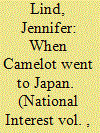

|
|
|
|
|
| Publication |
2013.
|
| Summary/Abstract |
THE UNITED States has security partnerships with numerous countries whose people detest America. The United States and Pakistan wrangled for seven months over a U.S. apology for the NATO air strikes that killed twenty-four Pakistani soldiers in 2011. The accompanying protests that roiled Islamabad, Karachi and other cities are a staple of the two countries' fraught relationship. Similarly, American relations with Afghanistan repeatedly descended into turmoil last year as Afghans expressed outrage at Koran burnings by U.S. personnel through riots and killings. "Green on blue" attacks-Afghan killings of U.S. soldiers-plague the alliance. In many Islamic countries, polls reflect little warmth toward Americans.
|
|
|
|
|
|
|
|
|
|
|
|
|
|
|
|
|
|
|
|
|